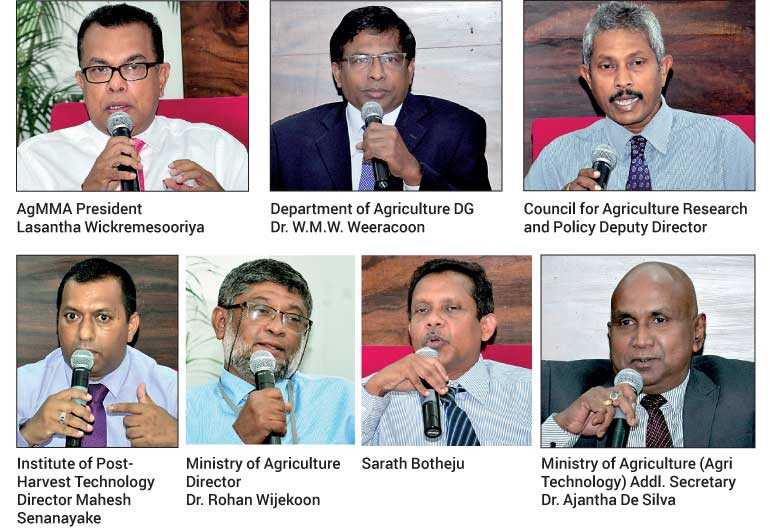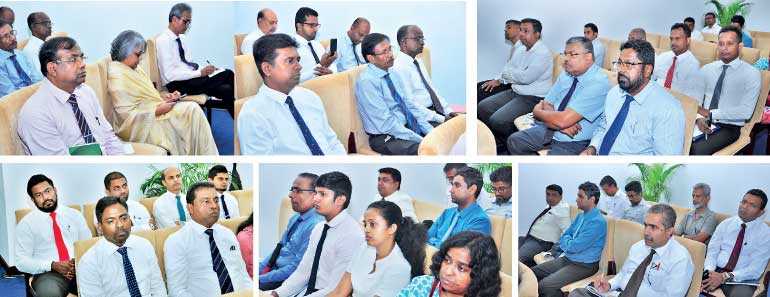Thursday Feb 26, 2026
Thursday Feb 26, 2026
Wednesday, 30 October 2019 01:09 - - {{hitsCtrl.values.hits}}
 By Divya Thotawatte
By Divya Thotawatte
Sri Lanka must focus on the mechanisation of agriculture, especially the non-paddy sector, while the private and public sectors should co-ordinate to find optimum solutions to improve the productivity of the farmer, said an expert recently.
The Agriculture Machinery Manufacturers and Suppliers Association of Sri Lanka (AgMMA) recently held a dialogue on ‘Smart Crop Production and Post Harvest Technologies’. AgMMA President Lasantha Wickremesooriya, delivering a speech during the event, said that the agricultural sector will be one of the most effective means of reducing poverty and achieving food security. He stated that mechanisation of agriculture was the way to move the sector forward and increase the productivity of farmers, in an effort to work towards ensuring food security.
He explained that Sri Lanka, as a part of the global society, needed to sync with global initiatives and that it required an approach to the whole value chain. “It includes production of quality seeds and planting materials, crop varietal development initiatives, bio-diversity management practices, integrated pest management systems, improved water use and management initiatives, sustainable soil and land management practices, sustainable mechanisation and post-harvest technology,” he explained.
Wickremesooriya stated that the mechanisation of agriculture in Sri Lanka was important, but it was mainly focused on the paddy sector. He noted that except in the process of planting, paddy cultivation is mechanised to an extent of 95%. While that is good news, he said it was also essential to focus on mechanisation of the non-paddy sector such as maize, ground nut, fruits and vegetables, cowpea etc. Another area of focus should be on postharvest technology.
“During my time with the fruit and vegetable export sector, we used to export to the Middle East, Maldives and Europe. Facilitated by the establishment of export production villages by late Lalith Athulathmudali, the then trade minister, Sri Lanka’s exports reached great heights. One of the main issues at that time were costs, which were attributed to the high postharvest losses, estimated around 40%. Much has been spoken about these losses, but very little work has been done to reduce this wastage. The same goes to the spice sector too. Hence the introduction of mechanisation to increase productivity remains an important facet in the improvement of the whole value chain of food production,” Wickremesooriya elaborated.
He stressed on the idea of moving forward while continuing to look for new solutions in mechanisation of agriculture. “We need to experiment with newer solutions until we find the appropriate machine that will suit our local conditions. It is an iterative process. Both the public and private sector need to work together to find optimum solutions to improve productivity of the farmer,” he noted adding that it was only through the aforementioned joint efforts that Sri Lanka would be able to work towards ensuring food security.
Department of Agriculture Natural Resources Management Centre Dr. Ajantha De Silva who was part of the panel discussion spoke about challenges to the agriculture sector if the country such as land, which was being diminished for other commercial ventures and development processes and the lack of sufficient labour. “The youth is moving away from agriculture, they are no more attracted to agriculture. They are more attracted to lucrative businesses. Due to that reason, we are now unable to supply enough labour to the sector,” he explained.
De Silva added that since Sri Lanka was a middle income country, the people have been requesting batter salaries for the work they do, which has resulted in the production cost of all food and plantation crops to increase every day. He suggested that the best way to reduce the cost of production through the reduction of labour, while also focusing on high efficiency and quality, was through mechanisation.
“Except for paddy, we can’t see a good momentum in other sectors. When we go for other crops, we have to think if production units, they are small-scale. When we consider mechanisation in these sectors, we should not go for big machines, rather small scale machinery with high efficiency. Moreover, most farmers might not have enough capital to invest in these machinery.” De Silva suggested that Sri Lanka could improve the machine hiring systems by rethinking and reorienting the mechanisms to cater to the demand from the industry.
Department of Agriculture Director General Dr. W.M.W. Weerakoon explained how most farmers in Sri Lanka are dissatisfied with their income. “The Sri Lankan farmer always works in their farms, but at the end of the day, they go back home with nearly nothing. He doesn’t get the better share of what he’s doing. We mostly do primary production and there is no evaluations for most of our produces.” He said that to do justice to the farmers most of the system should be changed, and mechanisation should be used to not only ensure efficiency, but also the quality of products and value additions.
Weerakoon stressed that the availability and affordability of the machines should be considered so that farmers’ difficulties would be reduced. He suggested that machine hiring centres would be greatly beneficial for farmers and that the Department of Agriculture was looking at the idea.
Pix by Sameera Wijesinghe
